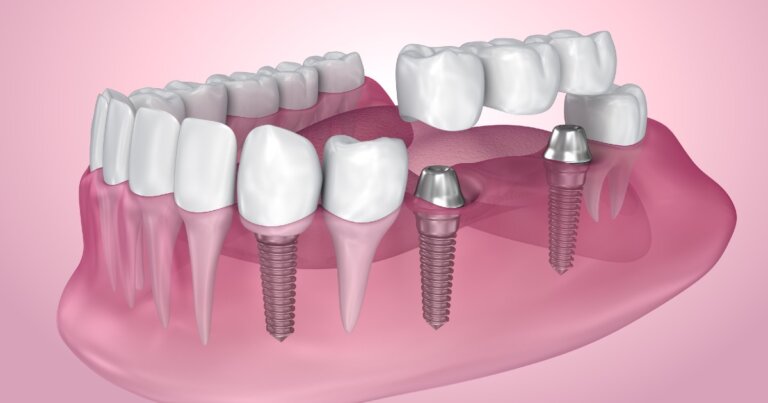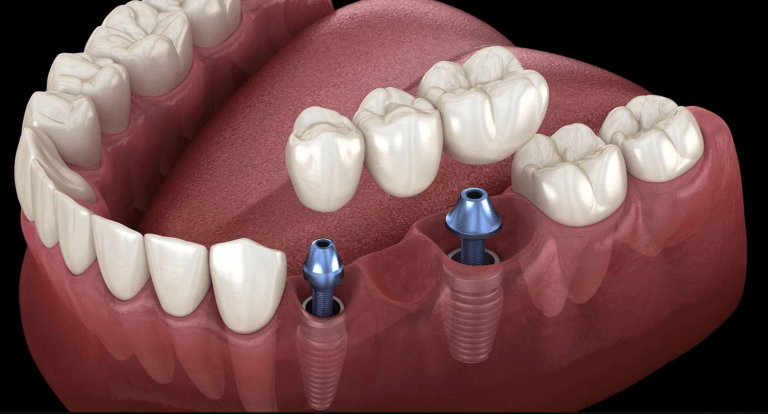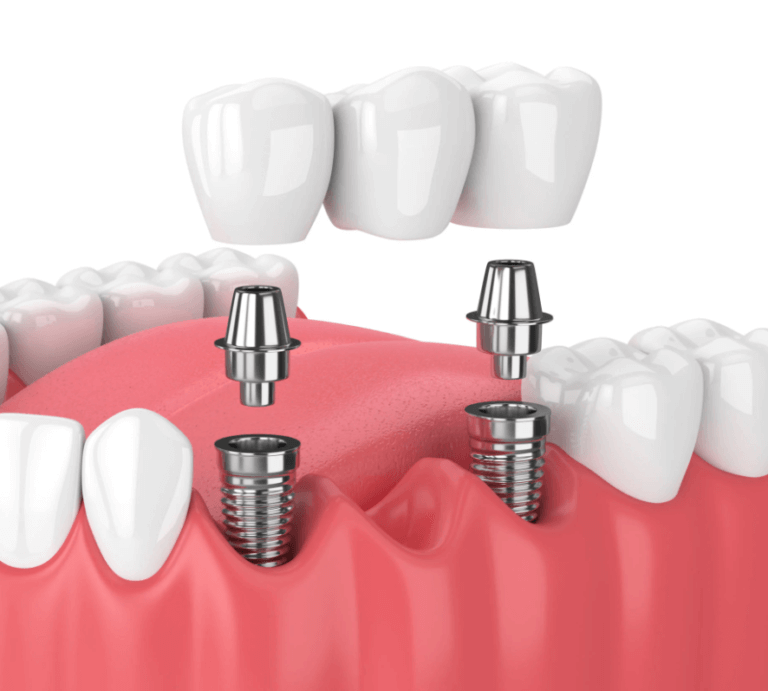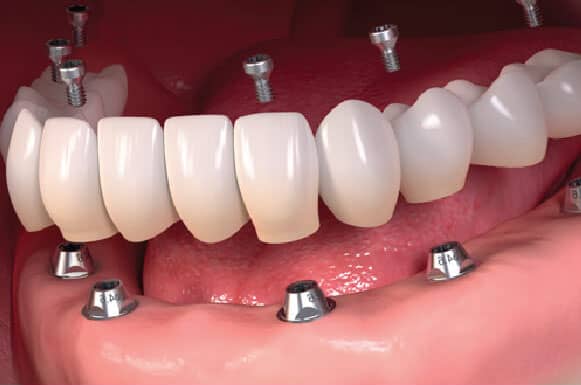Dental Implant Bridge

What Is A Dental Implant Bridge?
A Dental Implant Bridge is a modern tooth replacement option that offers a secure, long-lasting solution for individuals with one or more missing teeth. Unlike traditional dental bridges that rely on adjacent natural teeth for support, a dental implant bridge is anchored directly into the jawbone using dental implants, offering superior stability and function. Before you deciding on whether Dental Implant Bridge are right for you, there are some things you should know:
- Who Needs A Dental Implant Bridge?
- Types of Dental Implant Bridges
- Benefits of a Dental Implant Bridge
- Alternative Treatments To Dental Implant Bridges
- How Much Does A Dental Implant Bridge Cost?
- Steps In The Dental Implant Bridge Procedure
- Frequently Asked Questions About Dental Implant Bridges
If you have any further questions about Dental Implant Bridge or other dental services offered at Atlas Dental, please contact us.

Free phone consultation
Have questions about dental implant bridges? Schedule a free phone consultation with our Toronto dentist.

5 star google reviews
Our patients love us! See for yourself why people are choosing Atlas Dental in Toronto for dental implant bridge.

Dental Implant Bridge Emergency Service
Are you having trouble with your dental implant bridge? Book an emergency appointment today.
Who Needs A Dental Implant Bridge?
You may benefit from a dental implant bridge if:
- You have one or more missing teeth: Whether due to injury, decay, or other issues, a dental implant bridge can fill the gap, restoring your smile and ability to chew properly.
- Traditional dentures aren’t working for you: If you’re experiencing discomfort or instability with dentures, dental implants provide a stable alternative.
- Your dental work is failing: If you have crowns or bridges that are deteriorating, switching to a dental implant bridge offers a longer-lasting solution.
- You’re looking to preserve your jawbone health: Dental implants stimulate the jawbone, preventing bone loss, which can occur when teeth are missing for an extended time.
A thorough dental examination and consultation with a qualified dentist or oral surgeon are essential to determine your suitability for the procedure. Factors such as overall oral health, the condition of the jawbone, and any existing medical conditions will be evaluated to ensure the success of the dental implant bridge. If you have further questions about Dental Implant Bridges, please contact us.

Types Of Dental Implant Bridges
There are several types of dental implant bridges to suit different needs:
- Traditional Dental Implant Bridge: This is ideal for replacing a single missing tooth or multiple adjacent teeth. It uses one or more implants to anchor the bridge securely.
- Cantilever Dental Implant Bridge: This is used when there is only one adjacent tooth to the gap. It relies on a single implant for support.
- Implant-Supported Dentures (All-on-4 or All-on-6): For individuals missing most or all of their teeth, this solution uses four or six implants to support a full arch of teeth, providing a stable and comfortable alternative to traditional dentures.
The choice of the dental implant bridge type will depend on factors such as the location and number of missing teeth, jawbone health, budget considerations, and the patient’s overall oral health. Your dentist will work closely with you to understand your specific needs and recommend the most suitable option. If you have further questions about Dental Implant Bridges, please contact us.
Benefits of a Dental Implant Bridge
Here are some of the key benefits of having a dental implant bridge”
- Natural Appearance: Custom-made to blend seamlessly with your existing teeth, dental implant bridges look and feel like natural teeth.
- Restored Functionality: Enjoy the ability to chew, speak, and smile confidently without the worry of slippage, common with traditional dentures.
- Preserves Healthy Teeth: Unlike traditional bridges that rely on adjacent teeth for support, dental implants leave your natural teeth untouched.
- Durability: With proper care, dental implant bridges can last for many years, often a lifetime.
- Jawbone Preservation: Implants stimulate the jawbone, preventing bone loss that can occur with missing teeth.
- Improved Confidence: Dental implants restore your smile, enhancing your self-esteem and quality of life.
It’s essential to remember that dental implant bridges require careful planning and precise placement by an experienced dental professional. Your dentist will evaluate your oral health, medical history, and other relevant factors to determine your candidacy for the procedure. If you have further questions about Dental Implant Bridges, please contact us.

Alternative Treatments To Dental Implant Bridges
If a dental implant bridge isn’t the right option for you, there are other tooth replacement options available:
- Traditional Dental Bridge: Uses crowns on adjacent teeth to support the prosthetic tooth.
- Removable Partial Dentures: Replace multiple missing teeth but are not permanently fixed.
- Complete Dentures: Replace all teeth in a single arch but may lack the stability of implants.
- Resin-Bonded Bridge (Maryland Bridge): A conservative option for replacing a front tooth, bonded to adjacent teeth without the need for implants.
- Orthodontic Treatment: In some cases, braces or clear aligners can close gaps caused by missing teeth.
It’s important to remember that while alternative treatments offer various benefits, they may not provide the same level of stability, durability, and natural appearance as dental implant bridges. If you have further questions about Dental Implant Bridges, please contact us.
Cost of Dental Implant Bridge
The cost of a Dental Implant Bridge at Atlas Dental depends on the number of Retainers and Pontics involved, as well as the type of dental implant parts required to service your dental implant brand. A typical 3-unit dental implant bridge (involving 2 retainers and 1 pontic) at Atlas Dental would cost approximately $5500. This estimate does not include the cost of dental implant surgery. The codes relevant to Dental implant bridges in the Ontario Dental Association’s Suggested Fee Guide appear as follows:
Retainers, Porcelain/Ceramic/Polymer Glass
- 67205 – Retainer, Porcelain/Ceramic/Polymer Glass, Implant-supported: $1314 + Dental Lab Fee + Dental Material Expense
Pontics, Porcelain/Ceramic/Polymer Glass
- 62501 – Pontics, Porcelain/Ceramic/Polymer Glass Fused to Metal: $550 + Dental Lab Fee
Dental implant bridges are usually considered a supplementary service by dental insurance plans and may or may not be covered by your dental insurance. Sometimes, dental insurance may reimburse you an amount equal to a dental bridge. Be sure to find out from your dental insurance plan provider how much you are eligible for before going ahead with dental treatment. Your dentist can help you submit a predetermination to your dental insurance.
For patients without dental insurance, Atlas Dental is pleased to offer dental financing through iFinance Dentalcard. Affordable payment plans start at 7.95% for terms of 6 months to 6 years. To learn more about Dentalcard dental treatment financing, follow this link.

Steps In The Dental Implant Bridge Procedure
Wondering what’s involved in getting a dental implant bridge? Here’s a quick overview of the essential steps in the process:
- Consultation & Exam – Your dentist evaluates your oral health, using X-rays and CBCT scans to assess your jawbone, gums, and remaining teeth.
- Treatment Plan – Based on your needs, the dentist creates a personalized plan detailing the number of implants and type of bridge required.
- Implant Surgery – Dental implants are placed into the jawbone, typically with local anesthesia for comfort.
- Healing Phase – Implants need time to fuse with the bone, a process called osseointegration, which usually takes a few months.
- Abutment Placement – After healing, abutments are attached to the implants to support the bridge.
- Bridge Placement – The custom-made bridge, designed to match your natural teeth, is secured, restoring your smile’s look and function.
- Final Adjustments & Follow-Up – Your dentist makes any needed adjustments and provides aftercare instructions to help maintain your implant bridge.
With proper care, dental implant bridges can last for years. If you have further questions about Dental Implant Bridges, please contact us.
Frequently Asked Questions About Dental Implant Bridges
- Is the dental implant bridge procedure painful?
Local anesthesia is used during the procedure to minimize discomfort. Post-operative pain can usually be managed with prescribed or over-the-counter pain medications.
- How many dental implants are needed to support a bridge?
The number of implants depends on the length of the bridge and the location of missing teeth. Typically, two implants are used to support a bridge replacing three or more teeth, but this can vary.
- How long can a dental implant bridge last?
With proper care, a dental implant bridge can last many years, often exceeding 10-15 years, making it a durable tooth replacement option.
- How do I care for my dental implant bridge?
Maintain good oral hygiene by brushing and flossing regularly, attend regular dental check-ups, and avoid hard or sticky foods that could damage the bridge.
A dental implant bridge is a durable and effective solution for replacing multiple missing teeth, offering both functional and aesthetic benefits. If you have further questions about Dental Implant Bridges, please contact us.

